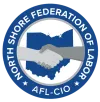Ohio Lawmakers Introduce Trio of Anti-Union Bills: Threats to Workers and Public Projects

Last week, Ohio lawmakers introduced three bills in the state legislature that, if enacted, would deal a serious blow to workers’ rights, public construction standards, and union protections. HB 510, HB 512, and HB 513 each pose distinct threats, but together they signal a coordinated effort to weaken unions and undermine the fair treatment of Ohio’s working people.
HB 510: A “Right-to-Work” Attack on Union Strength
House Bill 510, introduced by Rep. Levi Dean (R-Xenia), would enact a so-called “right-to-work” law in Ohio. While proponents claim this is about “freedom of choice,” the real effect is to strip unions of their ability to effectively bargain for better wages, benefits, and working conditions.
Right-to-work laws have consistently been shown to reduce union membership, lower wages, and weaken workplace protections. By making union membership and dues voluntary, HB 510 threatens the financial stability of unions and diminishes their power to advocate for workers. Across the country, right-to-work states pay workers, on average, thousands of dollars less annually than union-represented counterparts in non-right-to-work states.
For Ohio workers, HB 510 would be a direct attack on collective bargaining rights. The North Shore AFL-CIO and its affiliated unions will stand with working people to fight back against this attempt to weaken unions and erode decades of labor protections.
HB 512: Banning Project Labor Agreements
House Bill 512, introduced by Reps. Thad Claggett (R-Licking County) and Heidi Workman (R-Rootstown), targets Project Labor Agreements (PLAs) on public construction projects in jurisdictions without home-rule authority. PLAs are pre-hire agreements between contractors and unions that set uniform standards for wages, benefits, safety, and dispute resolution on major public projects.
PLAs are not just about union jobs—they are about ensuring quality work, safety on construction sites, and fair treatment of workers. They create predictable labor standards and prevent labor disputes from delaying critical infrastructure projects. Banning PLAs in Ohio threatens these safeguards, potentially putting taxpayers at risk for shoddy workmanship and delayed projects.
Supporters of PLAs understand that strong labor agreements benefit everyone: workers, contractors, and the communities that rely on public construction projects. HB 512 represents an effort to weaken organized labor’s role in protecting these standards, undermining both workers and the public interest.
HB 513: Weakening Prevailing Wage Protections
House Bill 513, introduced by Reps. Beth Lear (R-Galena) and Meridith Craig (R-Smithville), would allow local governments, special districts, and state colleges to opt into Ohio’s prevailing wage law and raise the threshold for projects that trigger its application.
Prevailing wage laws ensure that workers on public projects are paid fair wages reflecting local standards, preventing a race to the bottom in construction costs. Allowing local entities to opt out of these protections would create inconsistencies across the state, leading to underpaid workers and potentially lower-quality public projects.
The bill also threatens to undermine the broader labor market by allowing projects to bypass wage protections that have long supported a skilled, stable workforce. For unions and workers, prevailing wage laws are essential tools to maintain fair pay, attract qualified workers, and ensure public projects are completed safely and efficiently.
Why These Bills Matter
Together, HB 510, HB 512, and HB 513 represent a coordinated push by lawmakers to weaken labor protections in Ohio. These bills are not abstract policy debates—they directly affect the livelihoods of Ohio workers, the quality of public projects, and the strength of unions that advocate for fair wages and safe workplaces.
Ohio’s unions have long fought to ensure that working people have a voice on the job and a fair share of the wealth they help create. Right-to-work laws, bans on PLAs, and the erosion of prevailing wage protections are all tools to undermine this voice, making it harder for workers to bargain collectively, maintain good jobs, and support their families.
Public construction projects, which rely on skilled labor, will also suffer. PLAs and prevailing wage laws are safeguards that protect not only workers but also taxpayers and communities, ensuring that projects are completed on time, safely, and to high standards. Removing these protections will inevitably result in lower pay, fewer benefits, and lower-quality work—all while enriching contractors who cut corners at workers’ expense.
The North Shore AFL-CIO Stands With Workers
The North Shore AFL-CIO represents tens of thousands of workers across Ohio and has a long history of defending workers’ rights and strengthening unions. These bills threaten that work, but our response will be equally strong. We are committed to educating our members, mobilizing our communities, and engaging with lawmakers to fight back against legislation that harms workers and families.
We urge Ohioans to contact their state representatives and speak out against HB 510, HB 512, and HB 513. Public pressure is essential to prevent the erosion of labor protections and to ensure that working people continue to have a voice on the job and in their communities.
Unions are not just about collective bargaining—they are about fairness, dignity, and the right of workers to share in the prosperity they help create. These bills attempt to take that away, but working people and their allies will not stand by quietly.
What You Can Do
- Contact your legislators: Let them know that weakening labor protections is unacceptable.
- Spread the word: Share this information with coworkers, friends, and community members.
- Stay involved: Attend local union meetings and public hearings to voice your support for strong labor protections.
Ohio’s workers built this state, and they deserve fair pay, safe working conditions, and strong unions to defend their rights. HB 510, HB 512, and HB 513 are threats to those principles—but together, workers and unions can stop these attacks and protect the future of labor in Ohio.
Conclusion
The introduction of these three bills is a reminder that labor rights are never guaranteed—they must be actively defended. Right-to-work laws, bans on PLAs, and weakening prevailing wage protections are not abstract policies—they are direct assaults on working people. The North Shore AFL-CIO will continue to fight for fair wages, safe workplaces, and strong unions that can advocate for Ohio’s workers, their families, and the communities that depend on them.
